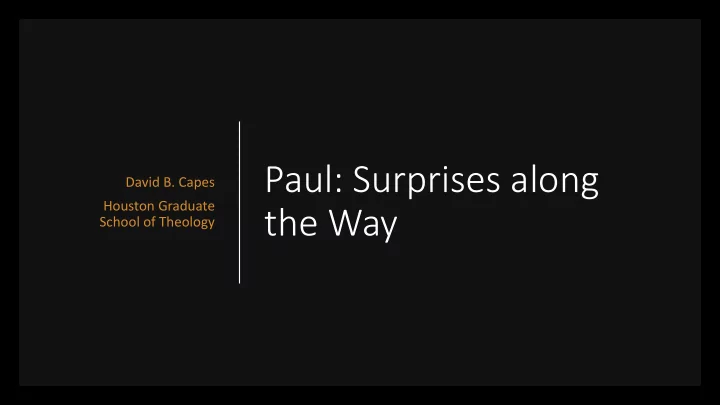

Paul: Surprises along David B. Capes Houston Graduate the Way School of Theology
Rediscovering Paul
Paul’s Missionary Strategy • Two heads are better than one • Urban strategy • To the Jew first • Then to the Greek
Paul’s Missionary Strategy Stay Healthy Find Common Ground (cross-cultural) Share the Kerygma What is the kerygma?
What is the kerygma? • Jesus inaugurated the fulfillment of messianic prophecy. • He went about doing good and performing miracles. • He was crucified according to God’s plan. • God raised him and exalted Jesus to his right hand. • He will come again in glory, power and judgment. • Therefore, repent, believe and be baptized for the remission of sins.
Paul’s Missionary Strategy • Establish churches • Appoint leaders (before he left) • Revisit the churches (if he can) • Send delegates (if he can’t) • Write letters
Rembrandt van Rijn Paul as a letter writer • Solitary • A Renaissance man • Contemplative
Paul as a Letter Writer In fact, letter writing was not a solitary affair; it was a communal affair. • Co-senders • Amanuenses (Secretaries) • Preformed traditions 1. Hymns 2. Creeds 3. Lists of virtues and vices 4. Qualifications for leadership
Paul as Letter Writer Paul’s co -senders • 1 Thess 1:1 Paul, Silvanus and Timothy • 2 Thess 1:1 Paul, Silvanus and Timothy • 2 Cor 1:1 Paul and Timothy • 1 Cor 1:1 Paul and Sosthenes • Philemon Paul and Timothy
Paul as Letter Writer Paul’s co -workers (letter carriers) • Eph 6:21 I am sending you Tychicus • Col 4:7-9 I am sending this letter by Tychicus and Onesimus • Titus 3:12 I am sending either Artemis or Tychicus
Paul as Letter Writer Amanuenses • Gal 6.11 See what large letters I write • Rom 16:22 I, Tertius, who write this letter • Philem 19-25 I’m putting this in my own hand • 2 Thess 3:17 The greeting is by me, Paul
Paul as Letter Writer The Cost of Paul’s Letters • Secretaries charged by the line (stichos) • He had to make drafts (usually on wax tablets); cutting the papyrus to size, scoring the lines, making his own stylus (pen), making his own ink • He had to prepare the final copies (one to send; one to retain) Cost of 1 Corinthians = $2100 Galatians = $700 Philemon = $100
Paul the Letter Writer • Finishing the Letters • Folding and sealing a letter • Folded like an accordion • Tied up with a piece of papyrus • Bit of clay was pressed over the knot • Paul’s letters were too long to be sent this way, they were rolled up.
Paul the Letter Writer Dispatching the Letter • No mail service available to Paul • Two possibilities 1. The Happenstance Carrier 2. The Courier
Paul the Letter Writer Writing a letter like we see in the NT was not a quick, lonesome affair. It was a communal enterprise. It took weeks, if not months, to compose and dispatch a letter like Romans or Ephesians or 1 Corinthians.
Paul the Letter Writer Greco-Roman Letter Form • Designation of Sender • Designation of Recipients • Greeting • Thanksgiving • Body • Closing Greeting
Points for home . . . We would do well to imitate Paul’s missionary strategy: 1. work cooperatively with others (you can’t do it alone); 2. go to where the people are; 3. start with places you expect might give you a favorable hearing; 4. stay healthy; 5. share the unadulterated gospel of Jesus the Messiah, the Liberating King; 6. start churches; 7. stay in touch (be present any way you can)
Points for home You can’t live the Christian life by yourself. It is a communal affair. The word “church” itself means gathering of people. If you’re not gathering, there is a question whether you are true participants in the Church. 1. Get connected (more than membership) 2. Stay connected 3. Find a way to use your gifts for “the common good” 4. Drink deeply from the Christian tradition
Drink deeply Her point seems to be that here we are as Christ-believers in the 21 st century and our identity is formed more by our culture than by our faith. She thinks, and I agree, that the Church has an identity crisis. We reflect more of the culture today than our own heritage. Culture today has a tendency to focus on who or what is trending. It is whatever is happening at the moment. She asks a great question: would the saints of the past be able to tell the difference between Church and theater? www.davidbcapes.com
Points for home . . . • She writes: “While Israel was admonished to “remember” and to stand at the crossroad seeking out the ‘ancient paths,’ the church today is merely looking around rather than looking back.”
Points for home . . . • God is at work already in the world, even before we show up. He is at work in the simple and mundane. Cutting of papyrus, the scribing of lines, the choice of words, the remembrance of hymns. God is a actor in history, the One Great Actor without whom history could not exist. • Practice and celebrate the presence of God in everyday life.
Recommend
More recommend